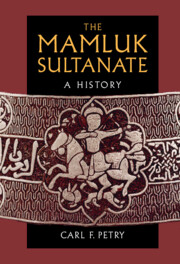Book contents
- The Mamluk Sultanate
- The Mamluk Sultanate
- Copyright page
- Dedication
- Contents
- Figures
- Maps
- Maps
- Introduction
- 1 Synopsis of Events
- 2 Ethos of the “Slave-Soldiers” Regime
- 3 The Mamluk Sultanate from a Global Perspective
- 4 Vocational Classes
- 5 The Political Economy
- 6 Cultural Legacy
- 7 The Rural Environment, Gendered Issues, Minority Communities, Sufi Practice
- Reflections
- Notes
- Bibliography
- Index
4 - Vocational Classes
Bureaucrats, Magistrates, Scholastics, Clerics
Published online by Cambridge University Press: 05 May 2022
- The Mamluk Sultanate
- The Mamluk Sultanate
- Copyright page
- Dedication
- Contents
- Figures
- Maps
- Maps
- Introduction
- 1 Synopsis of Events
- 2 Ethos of the “Slave-Soldiers” Regime
- 3 The Mamluk Sultanate from a Global Perspective
- 4 Vocational Classes
- 5 The Political Economy
- 6 Cultural Legacy
- 7 The Rural Environment, Gendered Issues, Minority Communities, Sufi Practice
- Reflections
- Notes
- Bibliography
- Index
Summary
Officials in the Sultanate may be classified as bureaucrats, judges, scholastics and clerics. Bureaucrats included the senior minister (vizier) whose fiscal authority diminished over time; bureau secretary (katib)—record keeper with fiduciary oversight; comptroller/supervisor (nazir) of fiscal departments; and chancellor (‘confidential secretary’: katib al-sirr) of the document bureau/foreign office. The civil judiciary was staffed by the judge/magistrate (qadi); notaries/court witnesses (shahid-s) who advised him on cases; market inspector (muhtasib) with oversight of commodity standards and pricing;and jurisconsult (mufti) charged with writing responses to legal queries (fatwas).Formal learning was conducted by the professor (mudarris) in a college of Law (madrasa); and repetitor (muʿid) who drilled textual recitation.Clerical offices included the prayer leader (imam); preacher of the Friday sermon (khatib); and Qurʾan reciter (muqriʾ). Individuals with leanings toward mysticism (Sufism) often joined an order (tariqa).
Keywords
- Type
- Chapter
- Information
- The Mamluk SultanateA History, pp. 129 - 153Publisher: Cambridge University PressPrint publication year: 2022

